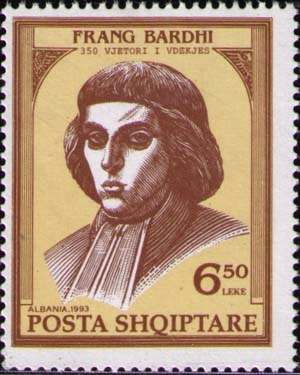
Isidore of Seville was a Hispano-Roman scholar, theologian, and archbishop of Seville. He is widely regarded, in the words of 19th-century historian Montalembert, as "the last scholar of the ancient world".
Fideism is a term used to name a standpoint or an epistemological theory which maintains that faith is independent of reason, or that reason and faith are hostile to each other and faith is superior at arriving at particular truths. The word fideism comes from fides, the Latin word for faith, and literally means "faith-ism". Philosophers have identified a number of different forms of fideism. Strict fideists hold that reason has no place in discovering theological truths, while moderate fideists hold that though some truth can be known by reason, faith stands above reason.
The five solae of the Protestant Reformation are a foundational set of Christian theological principles held by theologians and clergy to be central to the doctrines of justification and salvation as taught by the Calvinism and Lutheranism branches of Protestantism, as well as in some branches of Pentecostalism. Each sola represents a key belief in these Protestant traditions that is distinct from the theological doctrine of the Catholic Church, although they were not assembled as a theological unit until the 20th century. The Reformers are known to have only clearly stated two of the five solae. Even today there are differences as to what constitutes the solae, how many there are, and how to interpret them to reflect the Reformers' beliefs.

The Summa contra Gentiles is one of the best-known treatises by Thomas Aquinas, written as four books between 1259 and 1265.

John Paul II Catholic University of Lublin is a university established in 1918. It is the only private college in Poland with the status of a university.

The Archdiocese of Paris is a Latin Church ecclesiastical jurisdiction or archdiocese of the Catholic Church in France. It is one of twenty-three archdioceses in France. The original diocese is traditionally thought to have been created in the 3rd century by St. Denis and corresponded with the Civitas Parisiorum; it was elevated to an archdiocese on October 20, 1622. Before that date the bishops were suffragan to the archbishops of Sens.

Frang Bardhi was an Albanian Catholic bishop and writer. Bardhi is best known as an author of the early eras of Albanian literature. He served as Bishop of Sapë (1635–1644).
Ecclesia Catholica may refer to:
Scalimoli was a Franciscan friar and Catholic theologian, better known by his religious name, Andrea di Castellana, from his place of origin in Apulia, southern Italy.

Valerianus Magnus or Valeriano Magni was an Italian Capuchin, missionary preacher in Central Europe, philosopher, polemicist and author. He was one of the pioneers with the Torricelli's experiment and published one of the first accounts of it, the Demonstratio ocularis.

The Diocese of Chartres is a Latin Church ecclesiastical territory or diocese of the Catholic Church in France.

The Archdiocese of Tarentaise was a Roman Catholic diocese and archdiocese in France, with its see in Moûtiers, in the Tarentaise Valley in Savoie. It was established as a diocese in the 5th century, elevated to archdiocese in 794, and disbanded in 1801. The diocese of Tarentaise was again formed in 1825, and united with the diocese of Chambéry and diocese of Saint-Jean-de-Maurienne to form the Archdiocese of Chambéry, Maurienne and Tarentaise in 1966.

The Archdiocese of Chambéry, Saint-Jean-de-Maurienne, and Tarentaise is a Latin Church archdiocese of the Catholic Church in France and a suffragan of the Archdiocese of Lyon. The archepiscopal see is Chambéry Cathedral, located in the city of Chambéry. The archdiocese encompasses the department of Savoie, in the Region of Rhône-Alpes.

John Slotanus was a Dutch Roman Catholic polemical writer. He lived and worked most of his life in Cologne.

A dogma of the Catholic Church is defined as "a truth revealed by God, which the magisterium of the Church declared as binding". The Catechism of the Catholic Church states:
The Church's Magisterium asserts that it exercises the authority it holds from Christ to the fullest extent when it defines dogmas, that is, when it proposes, in a form obliging Catholics to an irrevocable adherence of faith, truths contained in divine Revelation or also when it proposes, in a definitive way, truths having a necessary connection with these.

Miguel Humberto Díaz is an American theologian, diplomat and commentator who served as United States Ambassador to the Holy See. He was nominated by President Barack Obama and confirmed by the U.S. Senate on August 5, 2009. He resigned on November 5, 2012, and was immediately named University Professor of Faith and Culture at the University of Dayton. He was the first Hispanic U.S. Ambassador accredited to the Holy See.
Francesco Pucci was an Italian philosopher and humanist.
Laurence Arthur Faunt was an English Jesuit theologian and missionary to Poland.
Basil Ishaq ibn Jubair was the maphrian and Archbishop of Nineveh. He converted to Eastern Catholicism and saw the turbulent times of the attempts of union of the Syriac Orthodox Church with the Church of Rome during the reigns of the Syriac Patriarchs of Antioch Ignatius Andrew Akijan (1662–1677) and Ignatius Gregory Peter VI Shahbaddin (1679–1702).
Claude Aubery, Claude Auberi or Claudius Alberius Triuncurianus was a French Reformed Protestant physician, philosopher and theologian. His doctrine, close to that of Sebastian Castellio or Andreas Osiander, was called Alberianism.
This page is based on this
Wikipedia article Text is available under the
CC BY-SA 4.0 license; additional terms may apply.
Images, videos and audio are available under their respective licenses.











